Ludwig Van Beethoven was a German composer and pianist. A crucial figure in the transition between the Classical and Romantic eras in Classical music, he remains one of the most recognized and influential of all composers. Take a look below for 30 more awesome and interesting facts about Ludwig Van Beethoven.
1. His best-known compositions include 9 symphonies, 5 piano concertos, 1 violin concerto, 32 piano sonatas, 16 string quartets, his great Mass the Missa solemnis, and one opera, Fidelio.
2. Born in Bonn, then the capital of the Electorate of Cologne and part of the Holy Roman Empire, Beethoven displayed his musical talents at an early age and was taught by his father Johann van Beethoven and by composer and conductor Christian Gottlob Neefe.
3. At the age of 21, he moved to Vienna, where he began studying composition with Joseph Haydn and gained a reputation as a virtuoso pianist.
4. He lived in Vienna until his death.
5. By his late 20s, his hearing began to deteriorate, and by the last decade of his life, he was almost completely deaf.
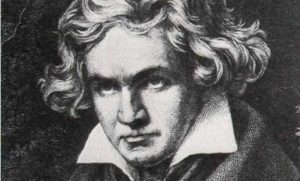
6. In 1811, he gave up conducting and performing in public but continued to compose. Many of his most admired works come from these last 15 years of his life.
7. When he died, his headstone had only a single word, “Beethoven.” He was so famous at the time, it was all that was needed.
8. It was reported that Beethoven often dipped his head in cold water before composing. Neither he nor anyone else has given any reason why he would do that.
9. Early in his career, for three years, Beethoven earned his living by playing the Viola in an orchestra. This is possibly one of the reasons he was said to compose for the piano, “as if it was a stringed instrument.”
10. Beethoven’s Sonata Opus 27 no. 1 took over two years to compose because he had to write the Prometheus Ballet just after he’d started it. The Ballet was a commission so he had to finish that first before he could go back to the Sonata.
11. After his mother died in 1787, he was forced to look after his younger brothers. Beethoven took his responsibilities very seriously, to the point where he refused to allow them to marry women who he thought were unsuitable.
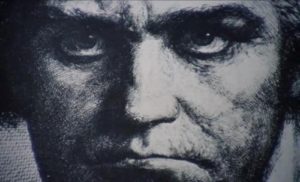
12. Thomas Broadwood, the English piano builder, sent Beethoven one of his pianos as a gift in 1818. However, by the time he received it, he was profoundly deaf and wouldn’t have heard a note.
13. We know a lot today about how Beethoven composed from his sketchbook, that have mostly survived.
14. In one of Beethoven’s letters, he said that he thought his deafness had started when he tripped and fell over after being startled. No one knows the real reason but it’s believed to have been more likely to have been a result of one of his many childhood illnesses.
15. He was always sick. The catalog of his ailments is long and his suffering would have been very real. During his life, he was known to have suffered from deafness, colitis, rheumatism, rheumatic fever, typhus, abscesses, ophthalmia, jaundice, chronic hepatitis, infections and cirrhosis of the liver.
16. Beethoven drunk a lot of alcohol and his father had been an alcoholic. He was once arrested as a vagrant due to his drunkenness.
17. Beethoven’s final words are believed to have been, “Pity, pity, too late!” Apparently, this was in response to having just received the gift of a case of wine from a music publisher.
18. Beethoven’s Ninth Symphony is often known as the Choral Symphony. It was the first symphony ever to have parts for singers.
19. His father, a failed musician, was a bully. He realized his son’s talent and, seeing financial rewards for himself, decided that he should be the new Mozart. He made the young Beethoven practice for hours. He died in 1792, before Beethoven’s greatness was truly realized.
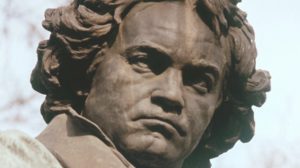
20. Young Beethoven had to leave school when he was 11 years old to help with family duties. As a result, he never learned multiplication or division.
21. Beethoven didn’t call his Sonata Opus 27, no. 2 the “Moonlight”, he called it no. 14. The name was penned by the German poet Ludwig Rellstab, a few years after Beethoven had died. Apparently, the poet thought the music sounded like moonlight reflecting on Lake Lucerne.
22. The Viennese Count Waldstein told young Beethoven that if he worked hard enough, he would receive Mozart’s spirit through Haydn’s hands.
23. By 1793, at the age of 22, Beethoven often played the piano in the salons of the Viennese nobility. He often performed the preludes and fugues from Bach’s Well Tempered Clavier and quickly established himself as a piano virtuoso.
24. Beethoven admired the ideals of the French Revolution, so he dedicated his third symphony to Napoleon Bonaparte, until Napoleon declared himself emperor. Beethoven then sprung into rage, ripped the front page from his manuscript and scrubbed out Napoleon’s name.
25. Beethoven only wrote one opera, Fidelio, because it took him over ten years of revisions. The original version is still occasionally performed and is known as Leonora.
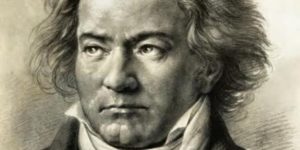
26. After becoming deaf, he communicated with his friends with conversation books, where they would write down what they wanted to ask him and he would write down his answer.
27. The date of Beethoven’s birth isn’t known. He was baptized on December 17th, 1770, so it’s usually assumed that he would have been born on the previous day.
28. Beethoven taught for most of his life although he would only teach students if they had the genuine talent or were pretty girls. The girls weren’t required to have any talent.
29. Beethoven always fell in love with unobtainable women, so he never married.
30. He fell in love with one of his students, Josephine Brunswick, in 1799. She was believed to be the intended recipient of his famous “immortal beloved” love letter. However, she married a Count instead.

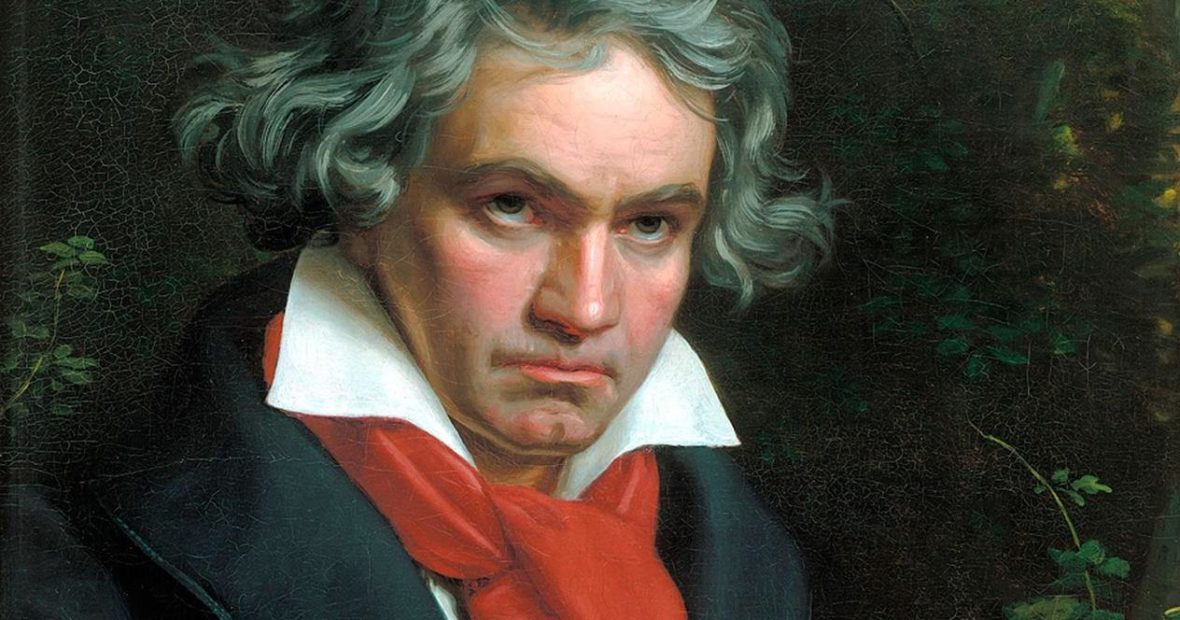



One Comment
Pingback:
June 16, 2018 at 9:22 pm